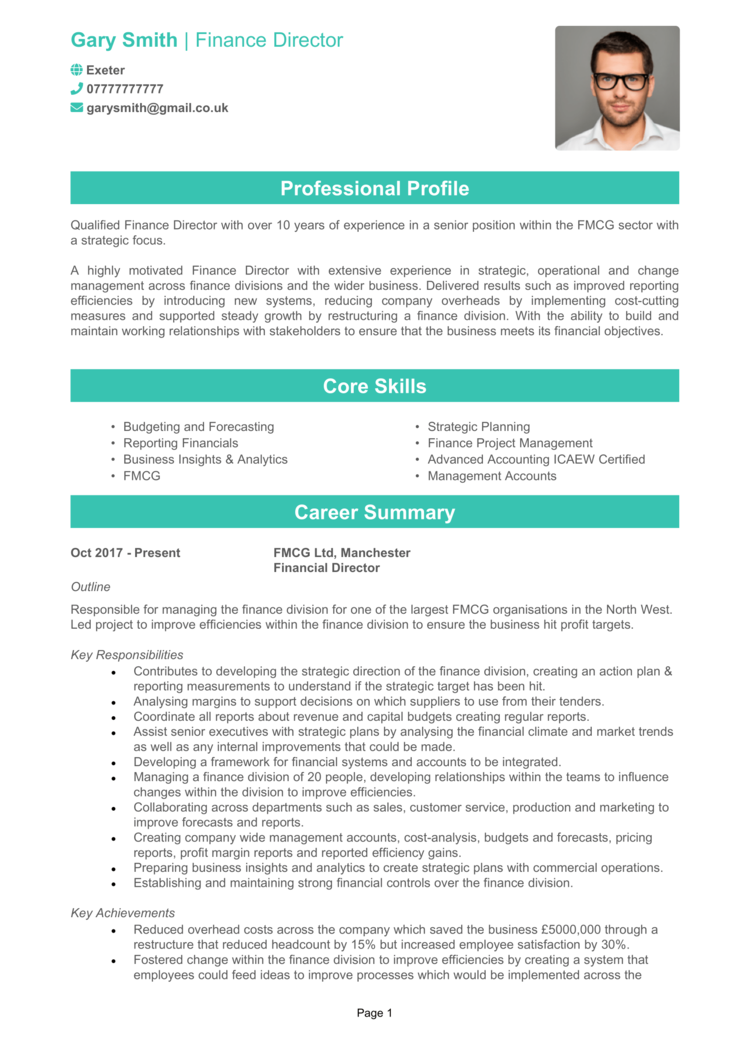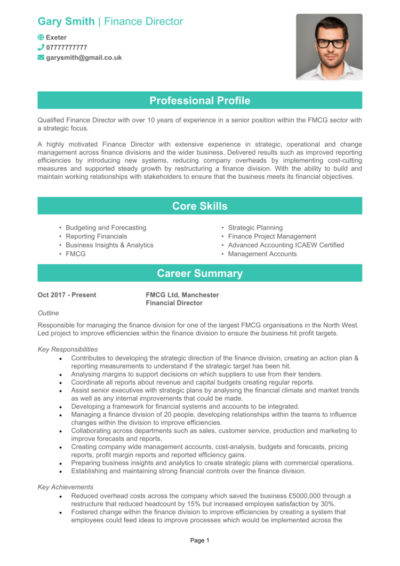Do you have the financial savvy to steer an organisation toward greater profitability and success?
As a Finance Director, you’re the architect of strategic financial planning and oversight. But before you can transform balance sheets, you’ll need to impress the recruiter with a CV that reflects your expertise, leadership, and vision.
This guide, complete with 2 Finance Director CV examples, will help you craft a CV that demonstrates your ability to manage budgets, optimise operations, and lead teams to financial success.
Finance Director CV

Commercial Finance Manager CV

How to write your Finance Director CV
Learn how to create your own interview-winning Finance Director CV with this simple step-by-step guide.
Writing your Finance Director CV is more than just a summary of your career – it’s your chance to showcase your leadership, financial expertise, and ability to deliver results.
From structuring and formatting it professionally to presenting your achievements and strategic impact, this guide will help you create a CV that captures a recruiter’s attention.
Finance Director CV structure


A Finance Director’s CV should be as precise and well-organised as the financial reports you produce. Recruiters need a clear layout to see your credentials, achievements, and expertise at a glance. They don’t want to feel like they’re reviewing a tax return – keep it clear and simple.
Here’s how to structure your Finance Director CV:
- Name and contact details – Ensure your personal details are at the top for easy access. Including a photo is entirely optional for nearly all roles.
- Profile – Draw in the reader with a convincing summary of your financial leadership, accomplishments, and strategic expertise.
- Core skills – Briefly highlight key abilities like budgeting, financial forecasting, and team leadership.
- Work experience – Walk the recruiter through your professional history in reverse chronological order, focusing on your strategic impact and results.
- Education – Include your academic qualifications and any professional certifications, such as ACCA or CIMA.
- Additional info – You can add hobbies and interests that demonstrate your leadership skills or dedication to professional growth.
Finance Director CV format


Your CV’s format should reflect the professionalism and attention to detail you bring to financial management. Remember, even highly accomplished candidates can miss out if formatting mistakes overshadow their qualifications.
Here’s how to format your Finance Director CV:
- Bullet points – Use them to break down tasks and achievements into easy-to-scan and readable details.
- Divide sections – Break your CV into distinct sections with clear headings for easy and logical navigation.
- Use a clean font – Ensure you’ve used a professional font that guarantees readability.
- Keep it the right length – Your CV should be no more than 2 pages, providing enough detail while holding the reader’s attention.
How to write a Finance Director CV profile


Your profile is your CV’s opening statement, where you present a compelling snapshot of your leadership and financial expertise. For a Finance Director, it’s the ideal place to highlight your strategic vision and key achievements.
Finance Director CV profile examples
Profile 1
Strategic Finance Director with over 12 years of experience in corporate finance, specialising in budgeting, forecasting, and financial planning. Skilled in driving profitability and managing multimillion-pound budgets across diverse industries. Proficient in SAP, Oracle, and financial reporting tools.
Profile 2
Reliable Finance Director with eight years of experience in the retail sector, focusing on cost optimisation, financial strategy, and team leadership. Adept at implementing robust financial systems and processes to support business growth. Experienced in using Power BI and QuickBooks for analytics and reporting.
Profile 3
Proficient Finance Director with 15 years of experience in multinational organisations, specialising in mergers and acquisitions, compliance, and risk management. Skilled in leading cross-functional teams, developing strategic plans, and ensuring regulatory adherence. Proficient in Tableau, Microsoft Dynamics, and IFRS reporting standards.
What to include in your Finance Director CV profile
Here are some tips to help your profile read like a glowing annual report, not a set of lost receipts:
- Where you’ve worked – Mention industries or companies you’ve led financially, especially those relevant to the role.
- Your top qualifications – Highlight degrees, certifications like ACCA or CIMA, and executive training programs.
- Essential skills – Include key abilities like financial forecasting, strategic planning, and risk management.
- Budgets or portfolios managed – Reference the scale of budgets, teams, or financial portfolios you’ve overseen.
- Key accomplishments – Mention high-impact results, such as cost reductions, revenue growth, or successful acquisitions.
Core skills section


Think of your core skills section as your financial portfolio – it shows off your most valuable assets. State your most marketable skills with just a column or two of bullet points
For Finance Directors, this should focus on leadership, financial strategy, and technical skills. Tailor these to the specific needs of the organisation you’re applying to join.
Best skills for your Finance Director CV
- Financial Strategy – Developing and executing financial plans to achieve organisational goals.
- Budgeting and Forecasting – Managing budgets and creating financial forecasts to guide decision-making.
- Risk Management – Identifying, assessing, and mitigating financial risks.
- Stakeholder Engagement – Communicating financial insights and strategies to key stakeholders.
- Cost Control – Implementing measures to reduce expenses and improve profitability.
- Mergers and Acquisitions – Leading financial due diligence and integration processes.
- Regulatory Compliance – Ensuring adherence to financial laws and standards.
- Performance Analysis – Monitoring financial KPIs and providing actionable insights.
- Team Leadership – Managing and mentoring finance teams to drive success.
- Technology Implementation – Leveraging financial software to streamline operations and reporting.
Work experience


Your work experience section is where you demonstrate your leadership and financial impact. Highlight the organisations you’ve worked for, the challenges you’ve faced, and the results you’ve delivered.
List your roles in reverse chronological order, focusing on measurable achievements and strategic contributions.
What’s the correct way to structure job history on your CV?

- Outline – Provide a brief overview of the organisation, your role, and the scope of your responsibilities.
- Responsibilities – Highlight key tasks like budgeting, forecasting, and stakeholder management. Use action verbs like “orchestrated,” “directed,” or “streamlined.”
- Achievements – Showcase measurable results, such as increasing profitability, securing investments, or improving financial processes. Always include numbers where possible to reinforce your impact.
Sample work experience for a Finance Director
Finance Director | InnoCorp Ltd
Outline
Led financial operations for a fast-growing technology company, focusing on strategic planning, risk management, and stakeholder engagement. Delivered sustainable growth through effective cost control and revenue optimisation.
Responsibilities
- Developed and implemented financial strategies to achieve long-term business goals.
- Managed annual budgets exceeding £50M, ensuring efficient resource allocation.
- Conducted financial analysis to identify opportunities for profitability improvement.
- Led the implementation of a new ERP system to streamline financial processes.
- Presented financial reports and insights to the board of directors and investors.
Achievements
- Increased EBITDA by 25 percent through cost reduction initiatives and revenue growth strategies.
- Successfully raised £10M in funding by preparing and presenting robust financial projections.
- Reduced financial reporting time by 30 percent with streamlined processes.
Finance Strategist | RetailSolutions PLC
Outline
Directed financial strategy for a national retail chain, focusing on improving cash flow and enhancing operational efficiency. Provided leadership to a team of 10 finance professionals.
Responsibilities
- Prepared and monitored financial forecasts to align with organisational objectives.
- Managed cash flow and working capital to ensure business continuity.
- Developed cost-saving measures that reduced overhead expenses by 15 percent.
- Collaborated with senior leadership to develop pricing strategies for new product launches.
- Ensured compliance with all financial regulations, including VAT and tax reporting.
Achievements
- Improved cash flow by 20 percent through optimised inventory and payment processes.
- Achieved a 98 percent accuracy rate in financial reporting during audits.
- Recognised for delivering a 10 percent increase in net profit year-on-year.
Financial Director | Global Finance
Outline
Oversaw financial operations for a multinational organisation, focusing on mergers and acquisitions, compliance, and risk management. Guided the company through complex restructuring initiatives.
Responsibilities
- Led financial due diligence for mergers and acquisitions, securing deals worth over £500M.
- Developed risk management frameworks to mitigate financial and operational risks.
- Directed the preparation of consolidated financial statements in compliance with IFRS.
- Managed relationships with external auditors, ensuring seamless audit processes.
- Implemented advanced financial reporting systems to improve data accuracy and accessibility.
Achievements
- Increased annual revenue by 15 percent through successful integration of acquired companies.
- Reduced compliance risks by 30 percent with updated governance frameworks.
- Delivered a £3M cost saving by renegotiating vendor contracts and streamlining operations.
Education section


The education section is critical for a Finance Director, as it highlights your academic foundation and professional training. Include degrees, certifications, and executive programs that reflect your expertise.List your qualifications in reverse chronological order, starting with the most recent. And don’t overcomplicate it; recruiters aren’t looking for a historical ledger of your academic life, just the highlights.
What qualifications do employers look for in a Finance Director?
- Chartered Accountant (ACA) – Certification for advanced financial management and strategic leadership.
- Chartered Institute of Management Accountants (CIMA) – Focuses on financial strategy and risk management.
- Association of Chartered Certified Accountants (ACCA) – Globally recognised certification for finance professionals.
- Master of Business Administration (MBA) – Advanced training in leadership and business strategy.Certified Public Accountant (CPA) – US-based qualification for financial accounting and auditing expertise.





